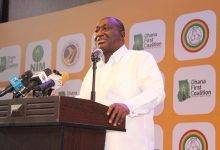
Under the breezy Kwame Nkrumah interchange sits Amina (not her real name).
She leans against one of the large pillars which carries the weight of the huge infrastructure, but her neck struggles to carry the weight of her head, as she slumbers intermittently.
The chaotic sounds of catcalls from bus conductors, beeping vehicles, sermons, and music blasting through speakers do not bother her at all.
The only noise that matters to her is that which is made by approaching footsteps because it is often her cue that a benevolent pedestrian could be bringing her next meal.
At such times, she sits upright, readjusts her sleeping baby in her arms, and then gets ready to beg for alms.
Amina is one of the hundreds of migrants on the streets of Accra, Ghana’s capital, who lives at the mercy of benevolent people, the weather, and in the last two years, the COVID-19 pandemic.
Many of such migrants from Burkina Faso, Niger, Nigeria, and Chad, have been forced to flee their countries because of terrorism.
Some are here in search of greener pastures and are, therefore, engaged in the sale of household items and the women, their bodies.
Although the business especially the begging, increases their risk of contracting the virus making them super-spreaders of the disease, migrants seem to be missing out on the vaccination drive.
They appear to be a missing link in the country’s quest to break the chain of transmission. Their seeming sideline would not hamper national efforts alone, but it is also a case of discrimination, and violations of UN and World Health conventions on migrants and human rights, highlighted later in this article.
It is also a setback to equity in vaccine access and global guidelines on vaccinations.
Ghana’s vaccination drive
Ghana’s strategy is to create herd immunity by vaccinating at least 20 million out of the current estimated 30.8 million Ghanaians.
The first consignment of 600,000 doses of the AstraZeneca COVID-19 vaccine, Covishield, arrived at the Kotoka International Airport on February 24, 2021, under the COVAX facility.
Subsequently, the first-ever COVID-19 vaccination in Ghana was rolled out on Tuesday, March 2, 2021, as part of optimal measures to stop the further spread of the disease.
This vaccination exercise made Ghana the first of 92 beneficiary countries to receive the COVID-19 vaccines from the COVID-19 Vaccine Global Access Facility (COVAX), according to the World Health Organisation (WHO).
Despite the longevity of its vaccination programme, as of June, this year, 10.3 million people, representing about half of the target population of 20 million, had received at least one vaccine dose.
According to the Ghana Health Service COVID-19 update on June 20, the country had administered about 16.5 million doses; while seven million people were fully vaccinated.
Case count
Just when the country thought the COVID-19 had reduced after cases reduced to less than 100, it has risen again to 1, 311 on June 20, pushing the total case count to 164,164 with recoveries standing at 161,405 and death toll at 1,448.
Migrants sidelined
Amina tells the Ghanaian Times that her family and fellow migrants are aware of the outbreak of the virus. She said they experienced fever, cough, and loss of taste or smell, which could be the virus, but none of them has received the jab because they are undocumented and, thus, cannot meet the ID card requirement for the vaccine.
“We take painkillers and herbs and get better when we are sick. We do not have access to healthcare and even the means to confirm what worries us. We know we are here illegally but we want to be safe too. It is difficult to get access to the vaccine ’, she said.
Another migrant, Oumarou, cited fear of being arrested and deported as another barrier to the vaccine. He said after surviving the lockdown which worsened their plight especially access to food, they could survive anything else.
“It is better I fall sick and die here than go back to Niger”, he said.
The General Secretary of Migrant Labour General Workers’ Union (MLGWU) Ghana, Justice BaakoNtarmah, confirmed the challenges posed by the ID card requirement.
He said although the union had heard that some 500 migrants and refugees had been vaccinated throughout the country, there were many of them who had not been vaccinated because they do not have IDs.
“Even those who have IDs are not vaccinated because of fears of suspicion. This is a challenge. We appeal to the GHS to change the system and make it free and voluntary for immigrants and refugees or foreigners to get access to vaccines. It will reduce infectious risk in Ghana” he said.
Conventions, global standards
There are a plethora of global policies regarding migrants and health. The Sustainable Development Goal 3, for instance, enjoins countries to ensure healthy lives and promotes well-being for all of all ages.
The Immunization Agenda 2030 of the WHO also aims to ensure that the world maintains the hard-won gains in health achievement – leaving no one behind, in any situation or at any stage of life.
In the WHO article on, “Refugee and Migrant Health” published on May 2, this year, the body highlighted that although different countries had separate legal frameworks, refugees and migrants were entitled to the same universal human rights and fundamental freedoms as other people.
“W.H.O believes that everyone, including refugees and migrants, should be able to enjoy the right to health and access to people-centred, high-quality health services without financial impediment, as expressed by our commitment to universal health coverage.
“Health systems should incorporate the needs of refugees and migrants in national and local health policies, financing, planning, implementation, monitoring, and evaluation,” it said.
Earlier, on April 7, 2020, the United Nations Human Rights issued guidelines on “COVID-19 and the human rights of migrants”, asking that: “Everyone, including all migrants regardless of their migration status, must be taken into account as an integral part of any effective public health and recovery response to COVID-19.”
These are binding on Ghana as a member state of these international bodies.
Public health specialist,
A public health specialist, Benson Owusu, said if migrants are left out, it would defeat the purpose of vaccination, adding that concerns expressed by the migrants should be looked into.
“If we decide to vaccinate only our citizens or those who have Ghana cards, we will not reach herd immunity. If we really want that then, whoever qualifies must be vaccinated otherwise the virus would continue to spread,” he said.
GHS response
The Programme Manager for the Expanded Programme on Immunization (EPI) of the Ghana Health Service, Dr Kwame Amponsa-Achiano, explained that the request for ID cards was not a deliberate attempt to deny anyone the jab.
“Most SHS students didn’t have identification cards so this is more of misinformation or disinformation. The ID card is only for registration purposes. You don’t need to be a Ghanaian before you can be vaccinated. And it is so for all vaccination programs”, he said.
Dr Amponsa-Achiano said in collaboration with the International Organisation for Migration (IOM), some refugees in Elmina in the Central Region and Bono Region had been vaccinated at their respective camps.
He said the national data did not have that categorization.
“In Accra, they don’t have any defined place. They are on the street so there is no data on them. what we did was to get the district. It is not true that they will be arrested or sent back to their country when they vaccinate”, he said.
Dr Amponsa-Achiano said following complaints that some people were being denied access to vaccines because of ID, the GHS had instructed health personnel in charge to give such people the shots.
He said about eight million doses of vaccine were available at the national level in addition to consignment at the districts and regions.
Other Countries
Other countries are making strides with migrant vaccination. Djibouti in East Africa is one of such. In October last year, the country with support from IOM vaccinated migrants. It was a crucial step toward safeguarding migrants as the country was considered a major transit route for migrants.
In December last year, South Africa also rolled out a COVID-19 Vaccination exercise for the estimated two million undocumented migrants.
These initiatives if replicated by Ghana would help the country break the transmission of the virus especially now that the cases have started rising again, following the easing of restrictions.
BY JONATHAN DONKOR







